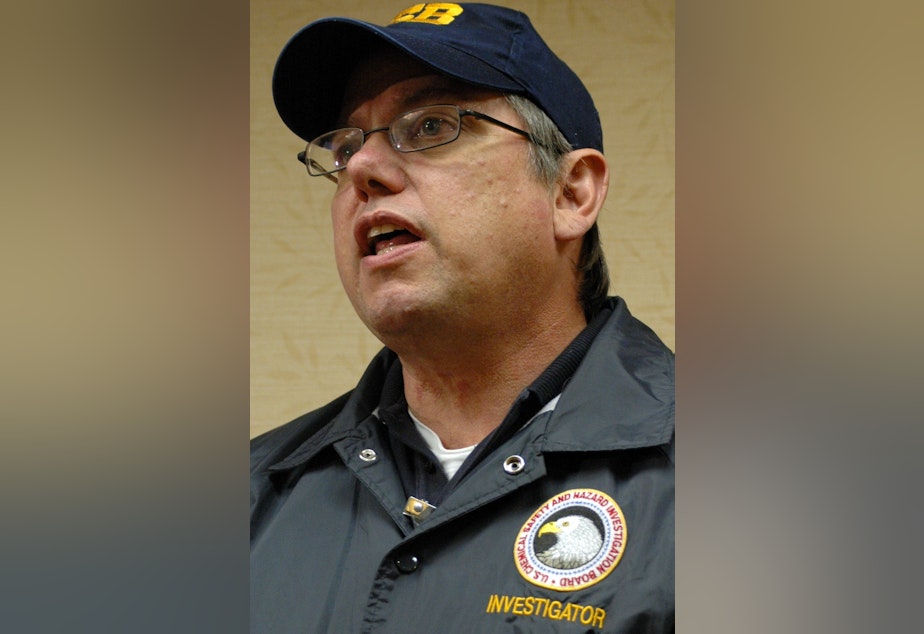Safety Problems Old And New At Anacortes Oil Refineries

The Shell Oil Co. refinery in Anacortes, Wash., sprang a leak last week. Shell quickly shut down the equipment that was boiling oil to make gasoline, but the shutdown led to a release of toxic gases.
Workers conducting an inspection of the refinery’s maze of pipes and towers discovered a hole overhead large enough that granules of a chemical catalyst were spilling out. The catalyst, a mix of chemicals including silica and alumina, speeds up the work of “cracking” big molecules of oil into lighter, smaller substances like gasoline and butane.
But shutting down the catalytic cracking unit — also known as “the cat” — and restarting it a few days later caused it to belch out foul-smelling sulfurous gases.
Shell reported seven separate outbursts of the toxic gases hydrogen sulfide and sulfur dioxide.
Katie Skipper with the Northwest Clean Air Agency said her agency won’t know how much of the sulfurous pollution was released until Shell submits a full report at the end of April. While agency officials said this probably was not a major pollution event, they want to find out why hydrogen sulfide puffed out, apparently in excess of the refinery’s legal limits, when the cracking unit was restarted.
Sponsored
“The shutdown was an emergency,” Skipper said. “A startup is a planned, known quantity. There shouldn’t have been exceedances at startup.”
Shell spokeswoman Kimberly Windon declined to answer questions but said the catalyst leak was small and that the equipment was shut down safely. She said no one was injured and the cracking unit is back up to full operation.
The Washington Department of Labor and Industries has cited the Shell refinery for serious safety violations five times in the past three years. Shell has appealed each time.
Union officials said that any time major refinery equipment is shut down or re-started, the risk of an accident goes up.
“We’re dealing with very, very volatile hazardous chemicals and substances,” said Steve Garey, president of the United Steel Workers local that represents Shell refinery workers. “So any time the process is upset for any reason, it presents more risk.”
Sponsored
Garey works next door to Shell at the Tesoro refinery in Anacortes. Seven workers there were killed in an explosion three years ago.
“There is a significant safety problem in the petroleum and chemical processing industry in this country,” Garey said. “These kinds of events have happened too frequently, in too many places, for too long.”
A few days after the April 2010 Tesoro explosion, federal investigators with the Chemical Safety Board arrived in Anacortes.
The Chemical Safety Board is an independent federal agency, modeled after the National Transportation Safety Board, that investigates accidents in the chemical industry.
“An investigation of this scope will likely take 18 months,” chief investigator Bob Hall told reporters. “We're not looking for just the immediate cause, but we’re going all the way to the root cause.”
Sponsored
Two weeks later, the Deepwater Horizon oil rig blew up in the Gulf of Mexico. The Chemical Safety Board’s team of investigators got called in to investigate that accident. They also investigated industrial explosions in Hawaii and California.
The safety board hasn’t had a team dedicated full time to the Anacortes accident since the days immediately after the explosion.
Three years later, the board still hasn’t finished its Tesoro investigation. On Tuesday, six members of Congress from Washington complained that three years is too long.
“It’s been three years,” Rep. Rick Larsen (D-Everett) said. “The families deserve an answer. Congress deserves an answer because we need to begin moving forward on how we can prevent something like this from happening in the future.”
Larsen said Congress can’t act to improve safety at refineries like those in Anacortes until it receives the Chemical Safety Board’s findings and recommendations.
Sponsored
Chemical Safety Board chair Rafael Moure–Eraso told Larsen in January that his agency is “grossly under-resourced for the size of its mandate.” Moure–Eraso said the safety board will finish investigating the Tesoro explosion by the end of this year.
The Chemical Safety Board's response to an earlier complaint from Rep. Rick Larsen:

